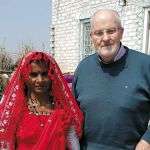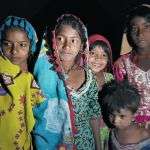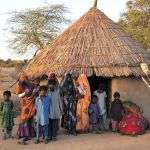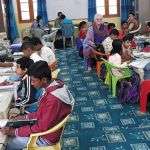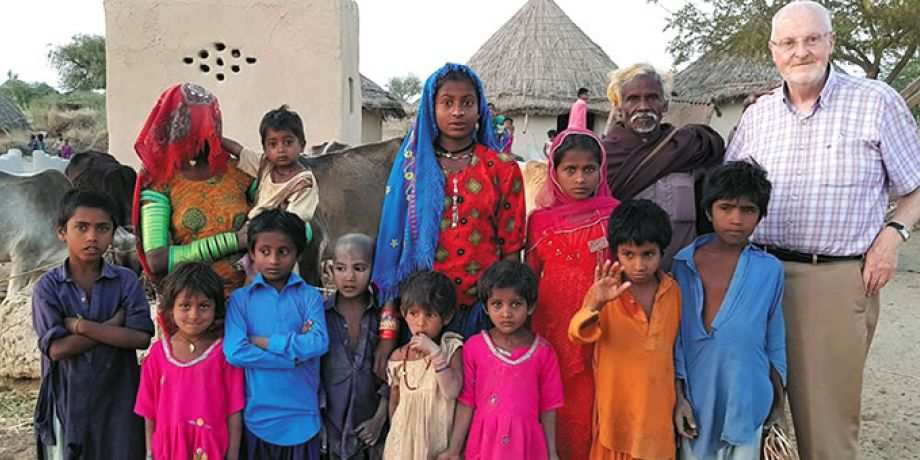
Hope for the Future
After completing my six year term as Regional Director for the Columbans in Ireland I had the opportunity to pay a return visit to Pakistan where I had worked for a number of years. Columban Fr. Tomas King and my classmate Columban Fr. Joe Joyce went beyond the call of duty in meeting me at Karachi Airport in the very early hours of the morning. This year Columbans are celebrating 40 years of mission in Pakistan. Over that period of time there have been many changes, but the enthusiasm for mission in this time of transition amongst the small Columban group is very encouraging. I had the opportunity also of meeting young Columbans whom I had not previously met, Pat Visanti from the South Pacific and Jerry and Elbert, two Columban seminarians from the Philippines. They will be joined later in the year by Columban Fr. Louie Ybanez, recently ordained from the Philippines. Early next year Columban Fr. Peter Dong, the first Chinese Columban who is currently studying in Ireland, will join the group. Recently two lay missionaries from the Philippines have arrived.
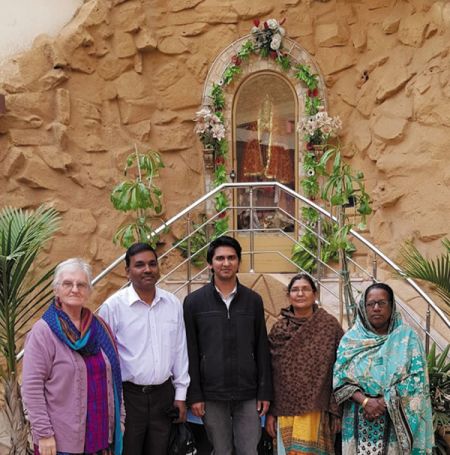
While my visit to some extent was a trip down memory lane, I was very conscious that one does not dwell on what was achieved and could have been achieved in the past but rather what are the hopes for future mission in Pakistan.
State of the Nation
At political, economic and security levels the country is still very fragile. Extremism is still a major problem. This was very evident by the very negative reaction by some fundamentalist groups to the acquittal of a Christian woman, Aasia Bibi, by the Supreme Court of Pakistan. She was falsely accused of blasphemy in 2009. The role that women play is very crucial to the whole fabric of Pakistan society. Sadly, this is not always recognized. The rules of the labor market as well as cultural norms, are against the participation of women. Threats of violence and lack of education have resulted in Pakistan having one of the lowest participation rates in the world for women. There has been a slight improvement, but the female labor force involvement is still very low compared with other developing countries in Asia. It is heartening to see women’s groups across Pakistan calling and pushing for solidarity with women in their quest for restorative justice against violence and harassment at the workplace, at home, in public spaces as well as at the hands of the security forces. Recognition of women’s participation in the production of food and cash crops is vital. Sadly, as is also the experience of other countries, corruption is endemic and needs to be rooted out.
Escalation of Tensions
During my stay in Pakistan there were two incidents which caused the escalation of tensions at a political level. The first was the incursion into Pakistani airspace by India. This was handled very well by the Prime Minister when he released the Indian pilot as a gesture of peace. At a personal level this had travel ramifications for me as I had to change my travel arrangements due to a number of airports being closed. The second incident were the horrific massacres that took place at the two mosques in Christchurch, New Zealand, where 51 innocent people were killed. Many of the victims originally came from Pakistan.
The day following the Christchurch massacres I traveled with Columban Fr. Dan O’Connor from Hyderabad to Badin parish. I was somewhat apprehensive as much of the journey that we traveled was through very isolated countryside. On the way we stopped to take some photographs of camels. Two elderly bearded men approached on a motorcycle and stopped. For a moment, because of the incident in Christchurch, I thought that we were going to be in trouble. To my surprise the reason they stopped was to ask about our welfare and were we alright. It was unusual for them to see two foreigners on such an isolated stretch of road. It gave us the opportunity to offer our condolences to them on the killings in New Zealand. They very much appreciated our small gesture. In the midst of heightened tensions there is always a ray of hope.
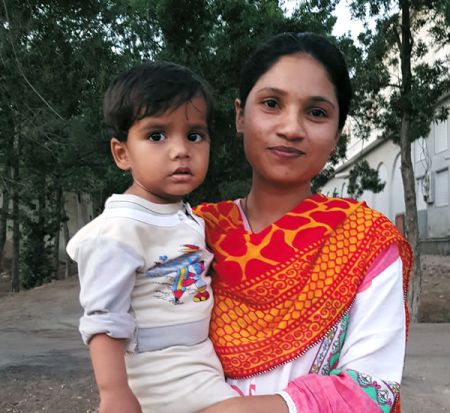
Hospitality
I was fortunate that I had been in Pakistan on a number of previous occasions and so the culture shock was not all that traumatic. It is a country teeming with life and movement. Karachi itself has a population of 20 million people. The one thing that has not changed over the years is the chaotic driving. People weave in and out of traffic with little regard for the rules of the road and the welfare of others. Going back to Pakistan gave me a different perspective on life. People are still very vulnerable and so many live in such poor conditions. Yet, one could not help but admire their resilience in such difficult circumstances. My abiding memory will be the hospitality and the welcome people showed me in the many areas that I visited both in the Sindh and Lahore.
On a Friday afternoon I stopped at a fruit vendor’s stall in Gulberg, Lahore. We engaged in conversation and before long a group had gathered to listen to what we were saying and also to have a group photograph taken. In typical Pakistani hospitality the fruit vendor did not want to take any money for the fruit that I purchased. This gesture was replicated on a number of occasions during my visit. To end this particular day it was very fitting that we ended up at a restaurant by the side of the road where we were served delicious fish and roti. We were entertained by two young gentlemen from the northern province who sat with us as we had our meal and who were full of questions as to why we were in Pakistan. They even offered to pay for our meal.
It made all the difference in having a Columban presence in the country. The Columban presence is now very international. I am indebted to the group, to Sr. Rebecca and the Columban Sisters for the welcome they gave me. I had the pleasure of staying with Columban Fr. Tomas King in Mirkpur Khas for most of the time where he is the Director of the Catechetical Center. The place gave me the opportunity to meet other religious congregations and diocesan priests. I used Mirkpur Khas as a base to visit many areas which entailed long journeys.
Most late afternoons I used to sit on the steps of the grotto in the Compound at the Joti Catechetical Center. It gave me the opportunity to have some quiet time. Visiting the grotto for many families was very popular. They came for a variety of reasons but mostly to pray for a member of the family who was ill. They would light candles. They would then approach me and ask for their photograph to be taken. These little encounters gave me the opportunity to experience the many problems they face on a daily basis, and yet putting their full trust in God.
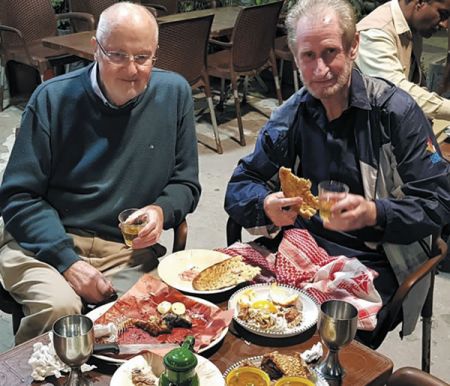
Visits to the Villages
I also had the opportunity to visit many of the villages with Columban Frs. Tomas King and Dan O’Connor. These visits were very special. For the most part the villages were very remote areas in the province of Sindh. Irrespective of their religious affiliation we always received a very warm welcome. An added bonus was being able to visit Nagar Parkar on the Indian border with Fr. Tomas. Because of the sensitivity of the area I had to have a special permit to travel to the place. I was very fortunate that the visit took place before the tensions between Pakistan and India erupted and the Christchurch massacres. One of the pleasant memories of the trip was stopping at a remote area for some refreshments. Such places give one a bird’s eye view of life in Pakistan. On the journey we had to pass three security stops to present our travel papers. At one of the security stops there was a big sign, “No Foreigners Beyond This Point.” Most of the journey to Nagar Parkar was through the desert. The Christian community amongst a mainly Hindu population lives very simply. I also had the opportunity of visiting a nearby Hindu village. I wondered at how the families could eke out a living in such a barren area. Their very meager income was supplemented by having some goats and a few animals. Here we were warmly welcomed by the people in traditional Pakistan hospitality, who offered us a cup of Pakistani tea. One has really to admire the great resilience of the people in such a challenging and barren area with its intense heat.
There is a lot of exploitation in Pakistan. It is good to see the Columban priests, Sisters, and other religious congregations responding to the needs of people by supporting them to relocate after being exploited by unscrupulous landlords and in the aftermath of severe flooding. These joint ventures of support have given an opportunity for people to live their lives with dignity and with some stability. Another such experience was my visit to the village of Rar in the parish of Khipro in Sindh with Fr. Tomas King and the Columban Sisters, Columban seminarian Elbert from the Philippines, and Fr. Pervaiz Ofm, whom I was meeting after many years. When one visits such places you are in a very different world, far removed from the intensity of life of the cities. In the stillness of the surroundings and full moon such places offer a space for quiet and reflection. A visit to the villages always ends with the celebration of the Eucharist with the people fully participating. One could not help but be impressed by the total commitment of the small group of Columbans in their outreach work with the most vulnerable particularly in the villages. This includes the work of Columban Fr. Tony Cavanagh in Badin parish who is totally committed in reaching out to the many poor Parkari Kolhi families in a vast geographical area.
Care for the Earth
During the visit I was very conscious of people’s efforts, particularly by Columban Fr. Liam O’Callaghan and Danish Yakoob in raising awareness through workshops on care for the environment. At first glance it seems an impossible task. I have never seen so much plastic waste as I have during my visit. Pakistan is seen as the seventh worst affected country by climate change. Environmental destruction in general in Pakistan and unsafe drinking water in particular, is a major contributor to social and economic instability, the breakdown of peace and order, higher sickness and mortality rates and growing poverty.
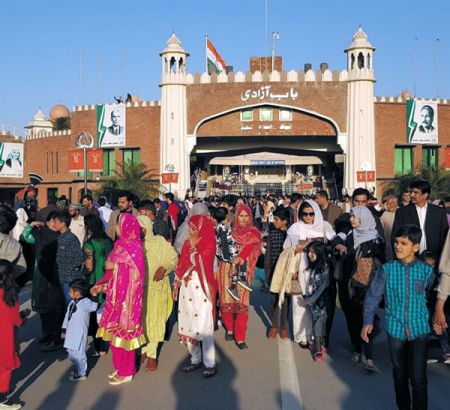
Fr. Liam and Danish are to be commended in raising awareness in the Hyderabad diocese in relation to the environment and water through community seminars/workshops/ training in parishes, schools and institutions; awareness raising during international environmental days; the establishment of a program of sustainable ecological learning, through the setting up of ecological committees in three schools in Hyderabad; the distribution of cloth bags for people to use in place of plastic shopping bags. An integral part of the program is encouraging tree planting and plastic-waste-reducing activities as well as advocating and lobbying local politicians and government officials by holding them to account to implement policies on care for the environment and delivery of safe clean water. These workshops have led to improved interfaith relations.
Visit to Lahore
My trip to Pakistan would not have been complete without a visit to Lahore, where the Columbans originally started 40 years ago. It was good to meet old friends from my time there. Yet it was a visit touched with a certain poignancy. Together with Fr. Dan O’Connor I had the opportunity of visiting the grave of Columban lay missionary from the Philippines, Pilar Tilos, who died unexpectedly some years ago, and the graves of Columban priests and contemporaries, Pat McCaffrey and Tommy O’Hanlon, buried side by side in the cemetery in Green Town, a suburb of Lahore. This was the area where I had worked, and I was able to recall many happy memories of the place. This was a very special visit but tinged with sadness as both died so young. Both had made a huge contribution to Columban mission in Pakistan which has been greatly acknowledged by so many. To show our appreciation we spread rose petals on their graves to let them know that they are not forgotten.
While in Lahore we visited the Waga Border, that separates India and Pakistan. The border is only about thirty minutes from Lahore. Compared to the previous times I visited it has become like a fortress stadium. We were there for the lowering of both the Pakistan and Indian flags. While it was a good spectacle to watch I felt a certain sadness that such borders exist today between neighboring countries. Each set of soldiers were vying with each other as to which country had the most clout. They were raucously applauded by those present from both countries. Freedom of movement is greatly curtailed because of the tensions. It was even a risk to have visited the place.
A Deep Sense of Gratitude
I have so much to be grateful for during my visit. I also look back with gratitude to my visit to Baji Miryiam, in Malir on the outskirts of Karachi. She is an extraordinary lady from Malta, in the same vein as the late Mother Teresa. I met Miryiam many years ago in Lahore. In Malir she runs a center for 53 very vulnerable male adults, many of whom she has picked up from the streets and who had nobody to care for them. She certainly relies on God’s providence and the generosity of people to support this very worthwhile project. I am deeply grateful to the many families who invited me to their homes for a meal or cup of tea.
During my visit I was very conscious of the generosity of so many of our friends and benefactors supporting our mission enterprises in many countries and particularly in Pakistan. The Columban group in Pakistan is small numerically, but they are responding very generously to the needs of the people, especially the most vulnerable. Your support makes their work very worthwhile. Thank you.
Columban Fr. Patrick Raleigh lives and works in Ireland.
Photo Gallery
